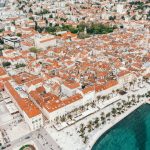ZAGREB, Feb 20, 2020 – Croatia’s economy has performed well, but convergence with the EU needs to accelerate, hard-won fiscal gains are fragile and should be carefully preserved, and a more dynamic state is vital for future economic prospects, are some of the assessments of the International Monetary Fund (IMF)
The Executive Board of the International Monetary Fund (IMF) concluded the IMF Article IV consultation with Croatia at the end of last week, and a press release and a comprehensive report by the IMF Mission were published at the IMF website on Wednesday.
The IMF Mission visited Croatia from 3 to 16 December last year within the framework of yearly consultations with member states, and they published their final statement at the end of their visit.
In a press release published today, the Executive board emphasised that Croatia experienced its fifth consecutive year of solid economic growth, once again driven largely by private consumption and tourism. The economic growth is expected to moderate, the says the IMF adding that both public and external indebtedness are due “to continue their declining trajectories.”
“The pace of fiscal consolidation in 2019 continued to slow, with the budget estimated to be close to balance. Recently agreed wage increases in the public sector are expected to increase current spending in 2020. Even though revenues will remain buoyed by economic activity, the budget balance is expected to turn into a small deficit in 2020, in part due to additional tax cuts,” it was stated in the IMF Executive Board’s press release, where it was also noted that contingent liabilities could also pressure budget balances in the coming years.
The IMF Executive Board also noted that Croatia was currently targeting ERM II entry in mid-2020, and eventually the Euro Area.
The Executive Board stressed that the Croatian economy had performed well, but convergence with the EU needed to accelerate.
“The Croatian economy has become stronger over the last five years. This is significantly because of strong budget management and skilful policies by the Central Bank. As a result, public debt has fallen along with interest rates, creating room for a robust consumption-led private sector expansion,” the IMF stated.
The Fund’s experts assess that unemployment was down, wages were growing, and inflation remained subdued.
“Yet, Croatia has barely reduced its distance with the EU average in terms of income per capita in the last decade, and emigration of the young continues to pose challenges.”
The IMF Executive Board also assessed that “hard-won fiscal gains are fragile and should be carefully preserved”.
“While public debt ratios continue to decline due to buoyant activity, fiscal performance has recently become encumbered by numerous spending demands,” stated the IMF, adding that for this reason, the members of the IMF Mission support the Croatian government’s decision to withhold the planned reduction in the overall VAT rate.
The IMF Executive Board also assessed that “a more dynamic state is vital for future economic prospects”.
“The budget is currently too rigid and losing its capacity to spark economic growth,” emphasised the IMF.
“Better absorption of EU funds could ease this shift in priorities but cannot substitute for deeper reforms to the cost structure of public administration, pensions and healthcare systems, and the fiscal and territorial relationships between different levels of government,” accentuated the IMF.
They also point out that state-owned enterprise management and performance needs more modernization and that “accelerating the digitalisation of public administration and using technological improvements to better target social-benefits would also help make the state more dynamic”.
The Executive Board also evaluates that “renovating the capital stock and enhancing the business climate will help raise potential growth”.
They also noted that recent improvements in streamlining the administrative and fiscal burdens on the business sector were welcome, but that members of the Mission also encouraged further progress in the areas of enhancing digital public services and adapting legislation to facilitate Croatia’s integration in the EU’s Digital Single Market.
More economy news can be found in the Business section.








